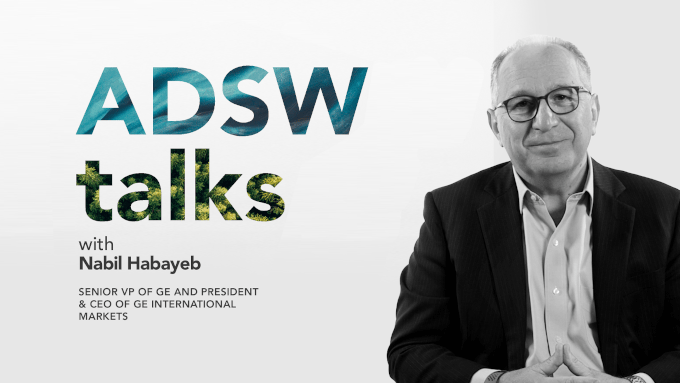Opening Ceremony lays the foundation for cross-sector collaboration and breakthrough solutions.
Focus on technology to solve “energy trilemma” GE’s Habayeb tells ADSW Talks
Greater technological innovation is required to solve the “energy trilemma,” Nabil Habayeb, GE Senior Vice President and President & CEO of GE International Markets, said in the latest edition of ADSW Talks.
The “energy trilemma” is the term coined by the World Energy Council referring to the need to ensure that energy is affordable, secure, and sustainable. “I’m committed to the sustainability effort and to making a difference around the energy trilemma,” Habayeb said. “The energy trilemma is about three parts. It’s about affordability, reliability, and sustainability. There are millions and millions of people that have no access to electricity, let alone affordable electricity, and let alone making it sustainable. Those three elements have to come together.”
Addressing that challenge, as well as others, requires technological innovation. “[What is really] important is the focus on technology, building upon the existing technologies to reduce emissions, for the purpose of reliability, affordability, and sustainability of energy in the future, but also investment into new technology -- renewable, nuclear, grid, and digital. I think this is where it all comes together,” he explained.
When asked how GE was supporting the global climate change agenda, Habayeb shared details on the company’s sustainable aviation fuel projects and added: “GE has made a commitment that by 2030 we will be net zero in our operations and by 2050 we have the ambition to achieve net zero in scope 3 with our products that we provide our customers. GE also made a commitment last year to exit new coal plants and to focus more on improving the emissions from gas turbines and combined cycle applications.”
In climate change mitigation, scope 1 refers to direct emissions from a company's owned or controlled sources, scope 2 refers to indirect emissions from the company's purchased electricity, steam, heating and cooling, and scope 3 is all other indirect emissions that occur in a company's value chain.
The GE leader explained that another important way to accelerate climate action is through meaningful dialogue and collaboration, which is being facilitated through events like the Abu Dhabi Sustainability Week (ADSW). “ADSW is a great forum... We feel it is important because it brings the different stakeholders that can really make a difference together, with diverse and different ideas, thoughts, debates, commitments, and this is what the world needs. We need the decision-makers in the countries, the technology providers, the experts, the suppliers, we need everyone to come together toward a common goal,” Habayeb revealed.



